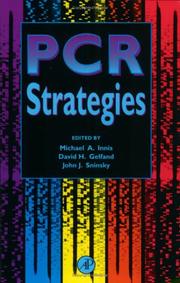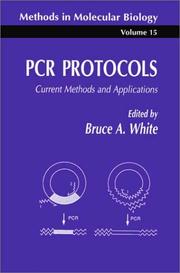| Listing 1 - 2 of 2 |
Sort by
|

ISBN: 9780123721822 0123721822 9786611046569 1281046566 0080538541 9780080538549 9781281046567 6611046569 0123721830 9780123721839 0123721830 Year: 1995 Publisher: San Diego (Calif.) : Academic press,
Abstract | Keywords | Export | Availability | Bookmark
 Loading...
Loading...Choose an application
- Reference Manager
- EndNote
- RefWorks (Direct export to RefWorks)
PCR Strategies expands and updates the landmark volume PCR Protocols. It is a companion laboratory manual that provides a completely new set of up-to-date strategies and protocols for getting the most from PCR.The editors have organized the book into four sections, focusing on principles, analyses, research applications, and alternative strategies for a wide variety of basic and clinical needs. If you own PCR Protocols, you will want PCR Strategies. If you don't own PCR Protocols, you will want to buy both!Key Features* Concepts explained*
Polymerase Chain Reaction --- Polymerase kettingreactie. --- Wetenschappelijke technieken. --- Polymerase chain reaction --- Réaction en chaîne de la polymérase --- Methodology. --- Méthodologie --- -Methodology --- Polymerization. --- Polymerisation --- Polymers --- Polymers and polymerization --- Synthesis of polymers --- Chemical reactions --- Chain reaction, Polymerase --- PCR (Biochemistry) --- Polymerization --- DNA polymerases --- Synthesis --- Polymerase chain reaction - - Methodology

ISBN: 0896032442 1592595022 9780896032446 Year: 1993 Volume: 15 Publisher: Totowa (N.J.): Humana press,
Abstract | Keywords | Export | Availability | Bookmark
 Loading...
Loading...Choose an application
- Reference Manager
- EndNote
- RefWorks (Direct export to RefWorks)
PCR has been successfully utilized in every facet of basic, cli- cal, and applied studies of the life sciences, and the impact that PCR has had on life science research is already staggering. C- comitant with the essentially universal use of PCR has been the creative and explosive development of a wide range of PCR-based techniques and applications. These increasingly numerous pro- cols have each had the general effect of facilitating and acceler- ing research. Because PCR technology is relatively easy and inexpensive, PCR applications are well within the reach of every research lab. In this sense, PCR has become the "equalizer" between "small" and "big" labs, since its use makes certain projects, especially those related to molecular cloning, now far more feasible for the small lab with a modest budget. This new volume on PCR Protocols does not attempt the impossible task of representing all PCR-based protocols. Rather, it presents a range of protocols, both analytical and preparative, that provide a solid base of knowledge on the use of PCR in many c- mon research problems. The first six chapters provide some basic information on how to get started. Chapters 7-19 represent primarily analytical uses of PCR, both for simple DNA and RNA detection, as well as for more complex analyses of nucleic acid (e. g. , DNA footprin ting, RNA splice site localization). The remaining chapters represent "synthetic," or preparative, uses of PCR.
Molecular biology --- Polymerase Chain Reaction --- Polymerase chain reaction --- Réaction en chaîne de la polymérase --- methods --- Methodology --- Méthodologie --- Electronic books. -- local. --- Polymerase chain reaction -- Methodology. --- Polymerization -- Methodology. --- Nucleic Acid Amplification Techniques --- Genetic Techniques --- Investigative Techniques --- Analytical, Diagnostic and Therapeutic Techniques and Equipment --- Animal Biochemistry --- Human Anatomy & Physiology --- Health & Biological Sciences --- -57.088 --- 577.2 --- Chain reaction, Polymerase --- PCR (Biochemistry) --- Polymerization --- DNA polymerases --- methods. --- Special methods and techniques for studing biological molecules. Separation. Centrifuging. X-ray study. Radioisotope methods --- Molecular bases of life. Molecular biology --- Methodology. --- 577.2 Molecular bases of life. Molecular biology --- 57.088 Special methods and techniques for studing biological molecules. Separation. Centrifuging. X-ray study. Radioisotope methods --- Réaction en chaîne de la polymérase --- Méthodologie --- 57.088 --- Polymerisation --- Polymers --- Polymers and polymerization --- Synthesis of polymers --- Chemical reactions --- Synthesis --- Cytology. --- Cell Biology. --- Cell biology --- Cellular biology --- Biology --- Cells --- Cytologists --- Polymerase chain reaction - Methodology --- Polymerase Chain Reaction - methods
| Listing 1 - 2 of 2 |
Sort by
|

 Search
Search Feedback
Feedback About UniCat
About UniCat  Help
Help News
News